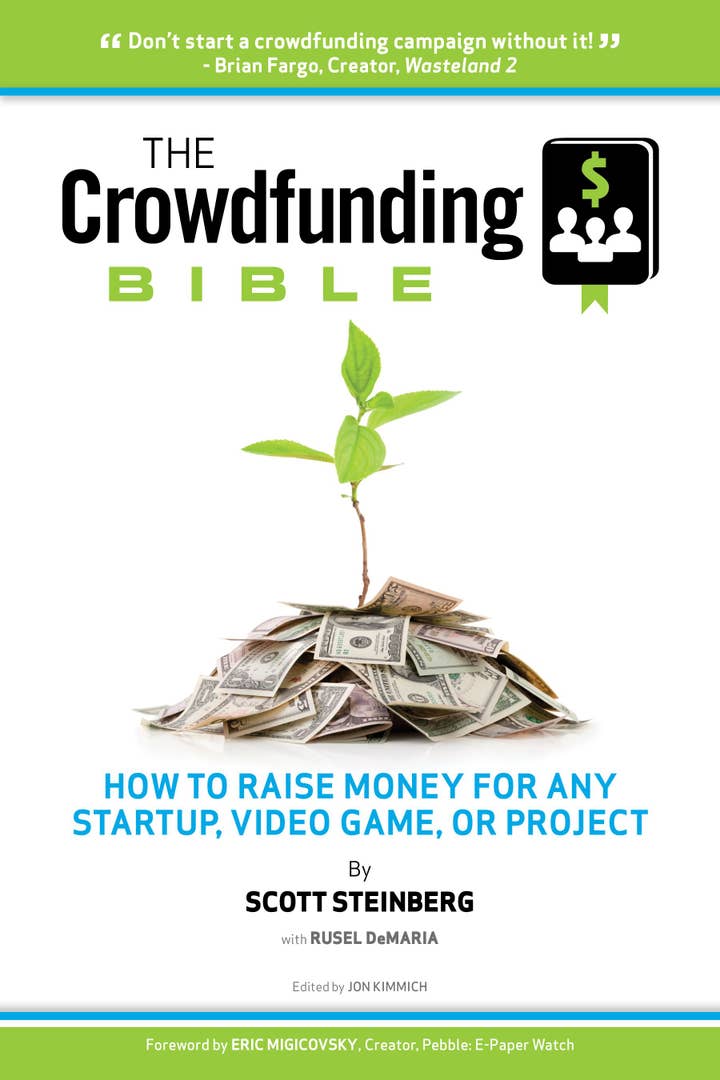Getting Your Crowdfunding Project Off The Ground
Scott Steinberg on leveraging Kickstarter and other crowdfunding platforms
Industry analyst and consultant, Scott Steinberg, CEO of TechSavvy Global, is launching a new business book today, The Crowdfunding Bible: How to Raise Money for Any Startup, Video Game or Project. The book is available as a free download here (or or in eBook form on Apple, Nook and Sony Reader devices), and features an exclusive foreword by Pebble: E-Paper Watch creator Eric Migicovsky.
GamesIndustry International has secured an exclusive excerpt from Steinberg, which you can read below. Game developers hoping to build projects with the help of Kickstarter or other crowdfunding platforms would be wise to read up.
_ _
People refer to crowdfunding projects as "campaigns," and they do so for a good reason. They require careful planning, clever resource allocation, consistent execution... and the recognition that even the best-laid plans may not survive initial contact with customers. You'll quickly discover that you are embarking upon a singularly time-consuming and challenging endeavor. Advance preparation is vital.

"Don't underestimate the amount of work [crowdfunding] campaigns require, both prior to and post launch," says Jordan Weisman (the driving force behind Shadowrun Returns on Kickstarter). "Just preparing a good video, taking time to make your message clear and editing the clip... to get the message across as intended takes a great deal of time. And then there's the written version of the story. The words are important. Look at which techniques have been successful for others and see how their methods apply to your project." Needless to say, his recommendations are just the tip of the iceberg.
Pre-Launch Planning
As with campaigns of any kind, preparation is critical. Decisions made here can make or break your project, so don't rush into them. Take your time to do your research and get things right. Plan your campaign with care and forethought.
Points to keep in mind when planning a crowdfunding project include:
Do Your Homework: Make sure that you have done your research on competitive products and campaigns, and understand precisely who and what you're going up against - as well as how your project can be positioned to differentiate itself and maximize its chances of success.
Define and Share a Common Goal: Everyone on the team should share a common vision of the project, be able to communicate a succinct description of its vision, understand who the venture's target audience is, and comprehend how to speak to this audience.
Understand the Stakes: If you are developing a new concept, product or IP, understand where the bar has been set by competing products and campaigns in terms of consumer expectation and production values. If you are leveraging an existing IP, fan base or market, research how many fans or customers exist for your venture, where to connect with them, and how they might consume information about it.
Preparing and Assessing Your Project
Your crowdfunding campaign is going to consist of several phases: Pre-launch preparation, launch programs, post-launch management (and campaign evolution), and post-completion follow-up. Each of these phases may require a considerable amount of work, especially if you are successful. In fact, the more successful you are, the more work you can expect to do.
The pre-launch phase is critical. Planning is when you can make or break your project, so don't rush into it. Take your time to do your homework and get things right.
Study Other Projects: This is critical. Look at campaigns that have worked and ones that have failed alike. What similarities and differences do they have with your project? What insights can you glean from them - and how can you avoid falling prey to the pitfalls on which they stumbled? Use this study time to also assess whether your project is really the kind of venture that works well in a crowdfunding environment, and what funding levels, rewards and marketing/social media campaigns are most appropriate.
Prepare Assets in Advance: Do you have enough product/project samples and supporting materials to quickly illustrate to potential backers what your idea is all about? Do you have visuals or videos that can clearly, quickly and concisely convey key message points, and demonstrate your project's upsides? If not, invest some time to develop corresponding images and/or videos that provide a clear impression of what your project is all about. A picture is worth a thousand words: Doubly so when you only have seconds to capture a viewer's attention.
Perfect Your Pitch: Refine your overarching vision and corresponding pitch, including all audiovisual and copywritten elements. Can you clearly and succinctly explain your project and its value in terms that your audience will understand and appreciate? Have you tried it out on friends and strangers to gauge their reaction and readjusted accordingly? Regardless of whether your project is ongoing or just beginning, or you've compiled pre-production assets, do you have something to show potential backers? Do you have representative images or video to share that illustrate your project and supporting assets? What other audiovisual and copywritten elements (concept art, prototypes, sketches, in-development scenes, songs, etc) have you arranged to leverage? Perhaps you have notable individuals' testimonials to share or other kinds of support. Line up everything you can and plan how and when to use these materials. Be sure to plan a promotional campaign that incorporates all elements - these materials will serve not only to define your project to the world, but as ammunition in the ongoing battle to promote it.
Plan your Rewards: Know what goods and services you have to offer, what they will cost you and how you will manufacture and distribute each. Be certain that you've created options that suit all pricing tiers, speak to a variety of backers, and have built in at least a handful or unique or eye-catching items and opportunities, if only for purposes of generating discussion.
Project Budgeting and Completion: Estimate how long it will take you to complete a project, allowing room for slippage - a 20-30% buffer is reasonable. Generate your budget and determine minimum funding levels (including any cushions) required to complete the project, and use a spreadsheet if necessary to calculate any costs that you may incur. Be sure to estimate service costs, expenses associated with reward fulfillment and even taxes (take time to speak with an accountant or other certified professional so that you fully understand potential financial and legal implications here) into your projected budget. Note that delays can have a significant effect on project overhead, shipping dates and funding goals.
Funding Targets: Don't make financial goals too high. Instead, ask for what you need at bare minimum to make a project work - and, in your project's description, describe added content, features, services or events that will be offered only if specific higher target goals are met. If you're successful, you may reach them. (Note that it's important to check funding rules for each individual site or service you are using before beginning as policies differ, i.e. most allow you to keep everything you make, even past your goal, but some do not.) Ultimately though, the less you're asking for, the likelier you are to incentivize potential backers into taking the plunge, as they'll be more willing to commit to goals that they believe are achievable.
Campaign Duration: Determine the optimum length of time to keep projects running. Some sites recommend that you keep the funding period down to as little as a few weeks, while others suggest that programs run for no more than 30 days at maximum. However, actual timeframes should be discussed and determined based on individual project need, including how much time it will take to raise awareness, how long you can sustain supporting promotional programs, and how important it is to create a sense of urgency (act now before funding closes!).
Run a Systems Check: Besides preparing campaign assets and tactics, ask yourself: Have you identified your target audience, and do you know where they consume news and media? Have you planned your reward strategies, and run them by friends and associates to affirm that they appeal? Are you confident that your funding target is reasonable, and aimed low as possible to increase chances of success without compromising your budget? Have you identified PR, marketing, media and social media you will need create and utilize to reach your audience?
Make Initial Outreach: Try to drum up some initial interest from friends, family and colleagues, or any existing support base that you have, and secure their promise to contribute once campaigns initially start - their support and contributions may create a sense of successful forward momentum that spurs others to rally to the cause. Work hard to get momentum going around the project early, and ensure resources are ready to bring to bear on day one, before you officially launch it.
Engage Fans Early: If you have an existing fan base or strong group of potential supporters, engage them early - perhaps even weeks before launching your campaign. One way to do so is to solicit their opinions when determining which rewards you will offer. This is something that InXile founder Brian Fargo did with the Wasteland 2 video game reboot project, and it helped catapult the venture forward from the moment it launched.
Get Ready to Proceed: Take a moment to pause, reflect and consider if you've set aside the time, funds and resources needed to dive in and make your crowfunding campaign a success, and make sure that you are mentally and physically prepared to take the plunge. If so, it's time to put all your plans in motion, and begin generating some buzz.









